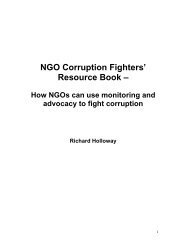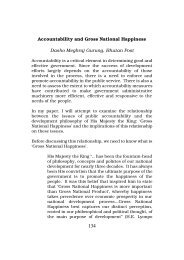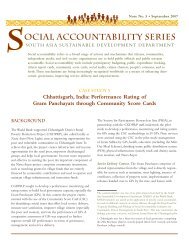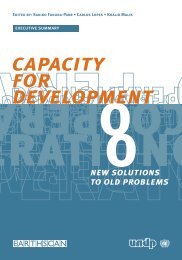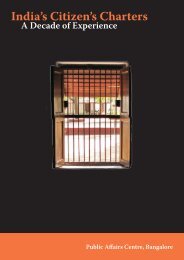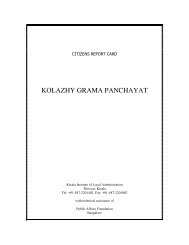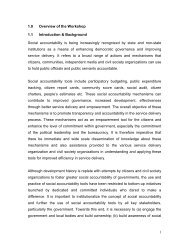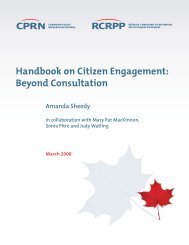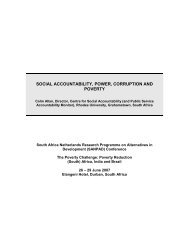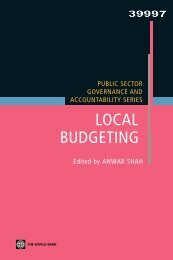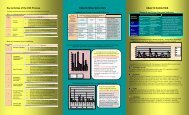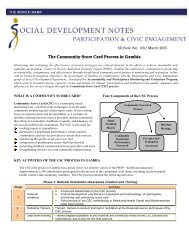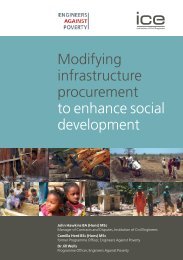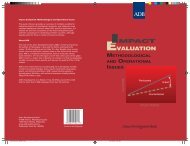Enabling Environment for Social Accountability in ... - SASANet
Enabling Environment for Social Accountability in ... - SASANet
Enabling Environment for Social Accountability in ... - SASANet
Create successful ePaper yourself
Turn your PDF publications into a flip-book with our unique Google optimized e-Paper software.
2.1.3 Economic Context<br />
Immediately after its political transition, Mongolia suffered from rapid economic contraction and the<br />
breakdown of its trade and economic relations with the Soviet-led Council <strong>for</strong> Mutual Economic<br />
Assistance (COMECON). However, Mongolia moved rapidly to establish a framework of market-based<br />
laws, policies, and <strong>in</strong>stitutions. In 2004, it had the world’s highest growth rate of 10 percent. Despite<br />
relative macroeconomic stability, however, the sources of its record economic growth have rema<strong>in</strong>ed<br />
narrow, and the economy rema<strong>in</strong>s vulnerable to external shocks.<br />
Similarly, Mongolia has mixed results <strong>in</strong> social sector development. S<strong>in</strong>ce its transition, Mongolia has<br />
preserved the relatively high levels of human development that characterized the socialist period and<br />
recovered from sharp drops <strong>in</strong> key <strong>in</strong>dicators such as <strong>in</strong>fant mortality and school enrollment (see annex<br />
4). However, progress toward several key Millennium Development Goals has been weak. For example,<br />
more than one-third of the population rema<strong>in</strong>s below the poverty l<strong>in</strong>e, and rural-urban disparities <strong>in</strong><br />
economic activity and social services have widened, contribut<strong>in</strong>g to further rural-urban migration<br />
(HIES/LSMS 2004). 23<br />
In particular, Mongolia’s economy rema<strong>in</strong>s highly dependent on the m<strong>in</strong><strong>in</strong>g sector. Accord<strong>in</strong>g to a<br />
background paper on “M<strong>in</strong>eral Wealth and Equitable Development” prepared <strong>for</strong> the 2004 World<br />
Development Report by UCLA Professor Michael Ross, Mongolia’s m<strong>in</strong>eral dependence is twenty-third<br />
highest <strong>in</strong> the world; this is due to its sizable deposits of copper, gold, and various other m<strong>in</strong>erals and its<br />
relatively narrow economic base. On the positive side, rapidly ris<strong>in</strong>g m<strong>in</strong>eral prices <strong>in</strong> recent years have<br />
fueled economic growth, improved Mongolia’s trade balance, contributed to Mongolia’s first budget<br />
surplus <strong>in</strong> 2005, and attracted significant <strong>for</strong>eign <strong>in</strong>terest and <strong>in</strong>vestment by large mult<strong>in</strong>ational m<strong>in</strong><strong>in</strong>g<br />
companies. 24 This m<strong>in</strong><strong>in</strong>g boom has catalyzed an <strong>in</strong>tense debate over whether Mongolia is receiv<strong>in</strong>g a fair<br />
share of the benefits from its m<strong>in</strong>eral resources. Some politicians have urged greater governmental<br />
participation <strong>in</strong> new m<strong>in</strong><strong>in</strong>g ventures, while the m<strong>in</strong><strong>in</strong>g <strong>in</strong>dustry rema<strong>in</strong>s opposed to amend<strong>in</strong>g the<br />
country’s 1997 M<strong>in</strong><strong>in</strong>g Law. 25 In addition, parliament recently passed a w<strong>in</strong>dfall tax on copper and gold<br />
revenues when prices exceed set levels. The current boom has also prompted discussions on how<br />
Mongolia can utilize m<strong>in</strong>eral w<strong>in</strong>dfalls accrued dur<strong>in</strong>g boom years to compensate <strong>for</strong> future price<br />
downturns; the GoM is discuss<strong>in</strong>g various options, <strong>in</strong>clud<strong>in</strong>g the establishment of a stabilization fund.<br />
The GoM’s decision late last year to jo<strong>in</strong> the global Extractive Industries Transparency Initiative, an<br />
<strong>in</strong>itiative promot<strong>in</strong>g good governance, transparency, and balanced development <strong>in</strong> resource-rich countries<br />
such as Mongolia, has been well received by civil society and <strong>in</strong>ternational partners.<br />
2.1.4 Legal Context<br />
All stakeholders, <strong>in</strong>clud<strong>in</strong>g CSOs, concur that Mongolia’s legal framework is relatively conducive to<br />
civic engagement and social accountability. Nevertheless, there rema<strong>in</strong> some problematic areas. For<br />
example, although the Mongolian Constitution and the 1998 Law on Freedom of Media guarantee<br />
freedom of expression, certa<strong>in</strong> legal codes such as crim<strong>in</strong>al defamation laws and media registration and<br />
licens<strong>in</strong>g systems may constra<strong>in</strong> the exercise of this right (see part III, F<strong>in</strong>d<strong>in</strong>gs 3.2.2 and 3.2.3).<br />
23 The Bank-supported Participatory Liv<strong>in</strong>g Standards Assessment documented the emergence of multiple sources of<br />
vulnerability.<br />
24 Copper and gold prices <strong>in</strong>creased by 28 and 8.6 percent, respectively, <strong>in</strong> 2005.<br />
25 An op<strong>in</strong>ion poll taken by Sant Maral <strong>in</strong> November 2005 showed that when the parliament debated the exist<strong>in</strong>g<br />
m<strong>in</strong><strong>in</strong>g laws, 41 percent of the respondents <strong>in</strong>dicated that <strong>for</strong>eigners or mult<strong>in</strong>ational corporations benefited a lot<br />
from these laws; and 30 percent <strong>in</strong>dicated that the GoM and politicians did as well. However, only 5 percent thought<br />
that ord<strong>in</strong>ary citizens benefit a great deal from the current legal regime, with 36 percent <strong>in</strong>dicat<strong>in</strong>g that they do not<br />
benefit at all.



